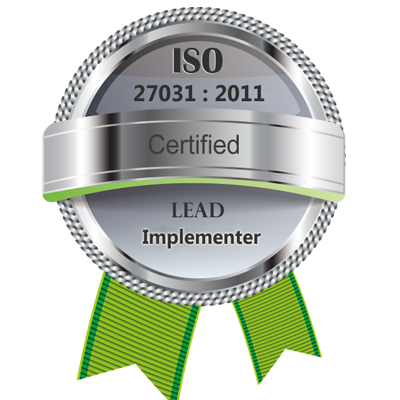ISO/IEC 27031:2011 - Lead Implementer
Exam Code: ISO-27031-LI

ISO/IEC 27031 provides guidance on the concepts and principles behind the role of information and communications technology (ICT) in ensuring business continuity. The standard incorporates the cyclical PDCA approach, extending the conventional business continuity planning process to take greater account of ICT. It incorporates ‘failure scenario assessment methods’ such as FMEA (Failure Modes and Effects Analysis), with a focus on identifying ‘triggering events’ that could precipitate more or less serious incidents.
Scope and purpose
The standard encompasses all events and incidents (not just information security related) that could have an impact on ICT infrastructure and systems. It therefore extends the practices of information security incident handling and management, ICT readiness planning and services. ICT Readiness for Business Continuity (IRBC) [a general term for the processes described in the standard] supports Business Continuity Management (BCM) “by ensuring that the ICT services are as resilient as appropriate and can be recovered to pre-determined levels within timescales required and agreed by the organization.”
The SC 27 team responsible for ISO/IEC 27031 liaised with ISO Technical Committee 233 on business continuity, to ensure alignment and avoid overlap or conflict. The FCD advised: “If an organization is using ISO/IEC 27001 to establish Information Security Management System (ISMS), and/or using ISO 2239PAS or ISO 23301 to establish Business Continuity Management System (BCMS), the establishment of IRBC should preferably take into consideration existing or intended processes linked to these standards. This linkage may support the establishment of IRBC and also avoid any dual processes for the organization.”
The standard:
Suggests a structure or framework (a coherent set or suite of methods and processes) for any organization – private, governmental, and non-governmental;
Identifies and specifies all relevant aspects including performance criteria, design, and implementation details, for improving ICT readiness as part of the organization’s ISMS, helping to ensure business continuity;
Enables an organization to measure its ICT continuity, security and hence readiness to survive a disaster in a consistent and recognized manner.
ICT readiness is important for business continuity purposes because:
- ICT is prevalent and many organizations are highly dependent on ICT supporting critical business processes;
- ICT also supports incident, business continuity, disaster and emergency response, and related management processes;
- Business continuity planning is incomplete without adequately considering and protecting ICT availability and continuity.
ICT readiness encompasses:
Preparing the organization’s ICT (i.e. the IT infrastructure, operations and applications), plus the associated processes and people, against unforeseeable events that could change the risk environment and impact ICT and business continuity;
Leveraging and streamlining resources among business continuity, disaster recovery, emergency response and ICT security incident response and management activities.
ICT readiness should of course reduce the impact (meaning the extent, duration and/or consequences) of information security incidents on the organization.
The mapping of this certificate against the e-Competence Framework. To know more on e-Competence Framework (e-CF) visit, ECF





